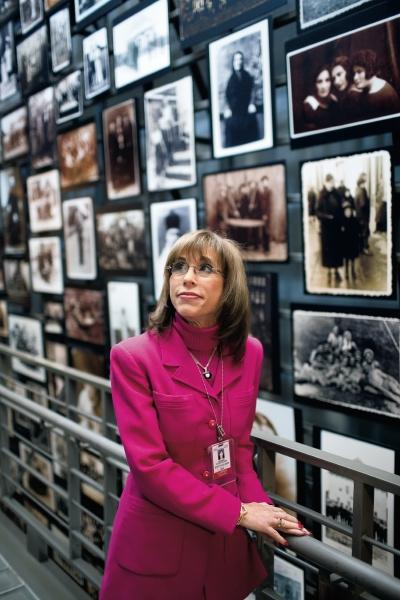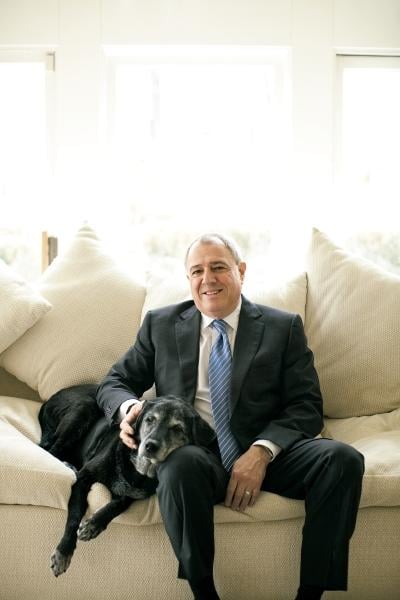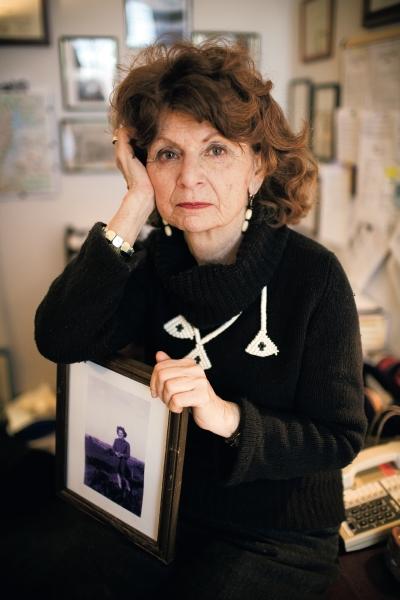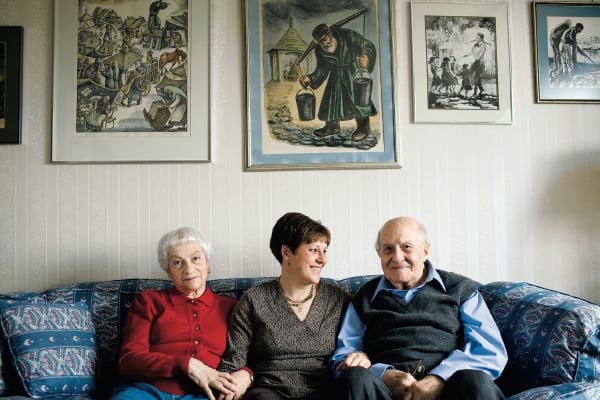All photographs by Scott Suchman
When he was seven, Jeffrey Zell’s mother put him on a public bus for the 20-minute ride from their house to a neighboring town where she’d heard the schools were better. It worked until town authorities discovered he wasn’t a resident.
Zell’s mother and father were Holocaust survivors who believed he had to learn to take care of himself.
At age ten, Jeanne Katz wanted to go to Girl Scout camp with her troop. Her parents, both survivors, refused to let her. “Every morning when I went to school, they reminded me not to smile at anyone,” she says. “You couldn’t trust anybody.”
April 21 is Holocaust Remembrance Day. Some Washingtonians will visit the Holocaust Memorial Museum. But for area residents whose parents were both survivors, almost every day is a remembrance day.
Having a parent who experienced the Holocaust makes you a member of the so-called Second Generation. Most parents of the Second Generation were teens when the Nazis began persecuting Jews. Most survived because they were strong enough to work as slave labor or attempt dangerous escapes. The Nazis took away years that might have been spent in school. Most survivors came to America with no degrees or skills.
Members of the Second Generation with only one survivor parent were more likely to be integrated into the mainstream of America. On one side of the family were uncles, aunts, and grandparents eager to embrace them. The nightmares of one parent could be balanced by the dreams of the other. But children of two survivors often grew up in enclaves of refugees. While their parents struggled—with demons, a new language, a new culture—they struggled as well.
Two survivor parents didn’t always agree on what their children needed to know about their experiences. Jeff Zell’s father was a proud supporter of DC’s Holocaust museum; his mother refuses to set foot in it.
Children of survivors are adults now, better able to understand what their parents endured. But they also realize how much it means for those who fought so hard to survive to have children and grandchildren: They represent the ultimate victory.
Jeanne Katz Olson
“The Elephant in the Room”
Jeanne Olson lives in Potomac, 3,000 miles from the world her parents created for her in Los Angeles. Her husband, Charles, is a professor at the University of Maryland and a consultant on energy issues. He’s a non-Jew.
It might look as though Jeanne Olson has left her past behind. The opposite is true. She met Charlie shortly after her father died. If her mother hadn’t agreed to move east with her, she says, she wouldn’t have married him. In the end, her mother stayed in LA—she couldn’t leave her familiar surroundings.
Olson’s parents, Irene and Josef Katz, were born in Germany. Irene, an only child, was 16 when she and her mother were arrested and told they were being “relocated.” Irene was soon separated from her mother and never saw her again. She spent time in Latvia’s Riga ghetto and in labor camps including Kaiserwald. In Riga, she saw a young man who was being held in detention for some offense against his Nazi captors. She managed to sneak a bit of food to him.
Irene Katz was liberated in Poland by the Russian army in 1945 and made her way to Berlin, a gathering place for Jews looking for loved ones.
Josef Katz, born in Lübeck, Germany, had a chance to escape before Jews were rounded up. A couple of his siblings got out. The one sister who stayed had married a non-Jew and survived, working in a pillow factory. But Josef, the youngest, refused to leave his mother behind.
At 23, Josef Katz was deported to internment camps in Latvia. He would later write a memoir, One Who Came Back, about his survival in Riga, Kaiserwald, and smaller labor camps as well as on a death march in Germany. He was liberated in 1945 and made his way to a hospital in Berlin that had become a haven for homeless Jews. The girl who had snuck bread to him was there.
“She comes toward me with outstretched arms,” he wrote. “We are both overjoyed. A miracle has happened.”
They married a year later and got on one of the first ships bringing survivors to America. They settled in New York City, but Josef felt confined. He thought about moving to Alaska. When Irene balked, they moved to Los Angeles. Jeanne was born there in 1952.
Josef swept floors to earn money. Slowly he and Irene learned English and started a ladies’-accessories business. Like many refugee couples, they both worked in the business. Josef’s sister who had survived the war married to a German moved to LA after her husband died. She took care of Jeanne while the girl’s parents worked.
Jeanne was born into a German-speaking household. When she was seven or eight, her father announced he wasn’t going to speak his native language. But his sister spoke only German to Jeanne—one of many paradoxes in her childhood.
Jeanne’s parents were suspicious of strangers but moved to an LA neighborhood where there were few Jews. Jeanne had to turn down an acceptance to Stanford and go to UCLA so she could live at home. “If it were up to my parents,” she says, “I’d still be there.”
At the same time, her parents—particularly her father—were restless. “They would decide at 4 am that we were all going to Las Vegas,” Olson recalls. “Or at 2 or 3, they would wake me up to go out for an ice-cream sundae.”

All conversations at home were somehow connected to the Holocaust. At the same time, her parents played talk radio all night in their bedroom—“maybe to keep thoughts of their experiences out of their minds,” she says.
Olson’s father retired at age 50 and began to buy apartment buildings. Real estate replaced Holocaust memories as the chief topic of conversation. “The elephant was still in the room,” Olson says, “but it became a little easier to function as a normal teenager.”
She sees similar paradoxes in her life today. She craves safety—the first thing she did when moving into her Potomac house was have a security system installed—but she’s restless, always eager to go somewhere, even if only to the grocery store.
Olson volunteers at the Holocaust Museum, where she runs the speakers bureau. “My father was so excited about this museum,” she says. But her office is in the building next door: “I haven’t been to the exhibits in the last five years. It’s too difficult.”
Jeffrey Zell
Trying to Please Dad
Jeff Zell grew up outside Pittsburgh. His father, Wolf Zelovitz—later Americanized to William Zell—was born in 1919 in a small town in what was Czechoslovakia. He learned forestry and woodworking, skills that helped keep him alive when the Nazis sent him to Auschwitz.
Jeff’s mother, Helen, learned to sew as a girl, and she and her sister went to Budapest to work as seamstresses. Then came the Nazis, and she was sent to Auschwitz.
Bill and Helen met right after liberation at a friend’s wedding. Their first child, Sam, was born in Czechoslovakia. He was six months old in 1948 when the Zells came to America. Bill had a sister who had left Europe before the war and settled in Pennsylvania, so the Zell family went there—first to McKeesport and then to York.
“When we saw the smoke coming out of the steel mills,” Helen recalls, “I felt like I was back in Auschwitz.”
Bill Zell started out delivering furniture. He was reunited with his brothers, who had been sent to labor camps in Europe. The brothers started a custom-furniture business. Helen Zell, now 84, still lives in the house her late husband built.
Jeff Zell was born in 1955. His brother, Sam, seven years older, was Jeff’s guide to a world their parents didn’t understand. Their mother and father spoke only Yiddish. When Jeff needed a note for school, Sam wrote it in English and their mother copied it. Sam also helped with homework. “When he left for college,” Jeff says, “my grades suffered.”
The boys shared a room until Sam started at the University of Michigan; they’d later go into business together.
Jeff and Sam grew up in an Old World household surrounded by the new “shtetl” that his parents, their remaining relatives, and other survivors created. It was a close-knit community. Bill Zell spoke openly about his Holocaust experiences; Helen never did. She sees no point in reliving Auschwitz.
But the unspoken memories shaped her son Jeff. His mother was always afraid they wouldn’t have enough money or that someone would take it away. Jeff Zell, a developer and real-estate consultant in DC, has multiple houses, closets filled with suits, and a wine collection. But deep down he also worries about having “enough.”
Zell’s father was reluctant to pamper his boys—he never told Jeff he was doing a good job. Despite his success, Zell is driven to do better, to win the praise he never heard at home. Zell’s mother is still on guard against anti-Semitism. For his own part, he deflects potential antagonism by contributing to charitable causes.
“Some people think that Jews give to Israel and nobody else,” he says. Zell is president of the Mid-Atlantic branch of the Starlight Foundation, providing services for seriously ill children, as well as a supporter of the Holocaust Museum.
Like most children of survivors, Zell feels deeply about family ties. He still calls his mother every morning.
Judith Taube Hines
Hiding Their Suffering
Judy Taube Hines of Olney was the last of five children. Her parents, Susan and Herman, ran a Baltimore grocery store, and she and her youngest brother were largely raised in the 1960s by her older sister, Miriam. The other siblings worked in the store.
“By the time I came along, my parents had worked through their ‘greenhorn’ issues,” Hines says. They had also gone to night school to learn English.
The Taubes had many friends who were refugees. “There were lots of parents who talked like mine,” she says.
Judy went to Jewish religious school, but her parents were less strict with her and her youngest brother than they’d been with their older children.
The grocery store burned down during the 1968 riots in Baltimore, and the family moved to Silver Spring.

It’s hard to connect the mom-and-pop-grocery-store owner with the Herman Taube many Washingtonians know. Over 40 years, he has worked for Jewish organizations and written 17 novels and books of poetry.
Herman Taube was raised by his religious grandfather in Lodz, Poland. Before the Germans annexed that country, he joined the Polish army and was sent to Siberia. He was part of the liberation of Poland and provided medical care to concentration-camp survivors.
That’s how he met his wife, Susan. She had grown up in Vacha, Germany. In 1938, her father, Herman, was arrested. Susan, her mother, Herman’s mother, and Susan’s sister, Hilde, moved to Berlin. Herman was released but was ordered to leave the country. He made his way to the United States in 1940.
Two years later, his family was deported to Riga, Latvia. When the Riga ghetto was liquidated in 1943, Susan, her sister, and her mother were sent to Kaiserwald concentration camp. She was moved to different camps as the Germans tried to avoid advancing Russian troops. Her sister and mother died in one of the camps.
“Liberated” in 1945, Susan was then forced to work for the Russians. She was in Koszalin, working on equipment to be shipped to the Soviet Union, when Herman Taube came to minister to one of her sick friends.
The Taubes married in 1945 and moved back to Poland for a year. Then they began to hear stories of new pogroms against returning Polish Jews. Because Susan’s father was in the United States, they were able to come here in 1947.
Judy Taube Hines doesn’t remember much about her maternal grandfather; he died when she was nine. But she thinks her mother must have harbored anger toward him; he got out of Germany, leaving his family to suffer Nazi brutality and death.
Her father always talked and wrote about the Holocaust, Hines says. Her mother didn’t tell her story; she hated the mental pictures. Both of them hid their suffering from their children: “They turned to each other for comfort.”
Hines was the first in her family to graduate from college. She went to the University of Maryland, lived on campus for two years, called home every day, then moved back in with her family.
She’s now an accountant, is married to Robert Hines, and volunteers at the Holocaust Museum’s visitor services. Her parents feel that the museum vindicates their experiences. Hines still carries an edge of bitterness: “I would never buy a Volkswagen.”
She’s uncomfortable without daily contact with her kids—one in college, one in medical school, and one out on her own. Says Hines: “I want a text message just to know they’re okay.”
David Fishkin
Son of an Angry Man
David Fishkin doesn’t speak to his father often. Jack Fishkin, he says, is an angry man.
Growing up, David realized that his father had two goals: to make a lot of money and to get recognition for the diary his sister Sarah had written during World War II before she was killed by the Nazis.
Says David: “He sacrificed a good life with us to obsess about the family he lost.”
Jacob Fishkin was born in the Polish village of Rubzewitz in 1925. The Germans bombed the town in 1941. When the Nazis arrived, Fishkin’s two youngest siblings were buried alive in a pit along with the village’s other young children. His mother, his aunt, Rachel, and his older sister, Sarah, were sent to one concentration camp, he and his father to another.
Jacob watched his father die. He managed to survive a number of camps including Mauthausen. After the war, he came to the United States because he had an uncle in New York. Years later, he discovered that his aunt Rachel—his father’s sister—and her children had survived and that she had salvaged Sarah’s diary.
Jacob Fishkin—later Jack—wanted the diary to get the attention Anne Frank’s had received. He wrote a book based on the diary. He convinced a playwright at New York University’s Tisch School of the Arts to write a play about it. Too bad, son David says, he didn’t lavish the same attention on his wife and children.
Jack met his wife-to-be, Miriam Motyl, at a dance frequented by survivors in Brooklyn. She had been born in Poland but in a more affluent family in Pruzany.
The Russians arrived ahead of the Germans in Pruzany in 1939. They took Miriam’s father prisoner; he later died in a concentration camp. Miriam, her mother, and her two sisters were sent to Siberia to a labor camp. Miriam was nine years old but was expected to work along with her sisters and mother. They ate onions and grass. His grandmother learned to barter what they had for food.

In 1945, they were repatriated to Poland, traveling over the mountains in a cattle car. In Siberia, Miriam’s older sister, Esther, fell in love with a fellow political refugee who was a Jewish scholar. A yeshiva in New York sponsored him, and he brought Esther’s whole family along to the States.
The Motyl women fared better than the rest of the Jews of Pruzany. When the Germans invaded in 1941, all the Jews were rounded up into a ghetto along with those from neighboring towns. Two years later, they were all shipped to Auschwitz.
In Brooklyn, Jack worked in the shoe business and eventually owned three stores. Anger was the dominant emotion of the family home. David’s sister, Sonia, was eight years older. She and his mother tried to protect him from his father’s wrath.
Because David was a boy, his father paid for him to go to yeshiva for 18 years; Sonia went to public school. Years later, Jack refused to pay Sonia’s law-school tuition. Miriam, who worked in one of the shoe stores, demanded a salary so she could pay it. Jack promptly sold that store.
Miriam suffered years of emotional abuse before divorcing his father when David was 18. “My mother wanted to hold our family together at all costs,” David says. She eventually moved to Atlanta, where his sister had settled. Until retiring at 75, his mother worked at a clothing store and was a top saleswoman.
The Holocaust was part of the curriculum at Fishkin’s yeshiva. Students were shown films of concentration camps.
His parents’ history made Fishkin more suspicious of the world: “My generation feels more animosity than they did.”
David Fishkin is a chiropractor, living in North Potomac with wife Ellen and daughter Dana. He sends his daughter to the Charles E. Smith Jewish Day School in Rockville but is more committed to Jewish culture than to formal religion: “Identification is very important.”
His mother has talked about her past, but when Fishkin suggested learning more about the town where she grew up, she wasn’t interested.
He paid a researcher to cross the border from Poland to Pruzany, now part of Russia, to take pictures and retrieve artifacts. He now has an old business directory that listed his great-grandfather’s store and a piece of a Siddur, a Jewish prayer book.
Claudine Schweber
The Peril of Indifference
Amid the stories of the Holocaust are tales of Jews who survived because they were helped by gentiles. Claudine Schweber’s parents both tell those stories.
Her father, Moishe, was born in a small town in Poland. His mother pushed her seven children to seek opportunities elsewhere. Moishe moved to Paris to study engineering. His sister Sonia was already there. Two of his other siblings went to Switzerland, while the other three went to Eastern Europe and were presumed killed by the Nazis.
After Germany invaded France, it was no longer safe there for Moishe—now Maurice—and Sonia. They escaped with Sonia’s daughter over the Alps to Switzerland.
Schweber’s mother, Vera, was born in Vienna in 1927. Her father, Wolf, was a printer and political activist. In 1938, Nazi gangs rioted, burned Jewish businesses and synagogues, and attacked Jews. Wolf was badly beaten. Vera, her parents, and her brother, Fred, escaped to Belgium. In 1940, the Germans invaded that country and rounded up all of the Jewish men, including Wolf. Her mother was paralyzed with fear, and 13-year-old Vera took over responsibility for the family. Early in 1941, she managed to get three train tickets to move her mother, brother, and herself to southern France.
France under the Vichy puppet government wasn’t exactly a safety zone. An organization called Oeuvre de Secours aux Enfants (OSE), dedicated to helping Jewish children, had set up summer camps. While Vera and Fred were at an OSE camp, they got a postcard from their mother saying she had gone to visit their grandparents. They knew the real message: Their grandparents were dead.
As the war progressed, OSE set up homes for Jewish children and hid many of them with the help of Catholic and Protestant groups, moving them east until the organization could get them into Switzerland. Vera and Fred went over the border into Switzerland just before her 16th birthday.
After the war, Schweber’s parents returned to France to work for OSE. The homes served as halfway houses for children coming from concentration camps before they could be resettled permanently. One of those children was future Nobel laureate Elie Wiesel.
Claudine Schweber was born in France in the late 1940s. Her family lived there until the 1950s, when relatives of her mother helped them get to the United States. The family first lived on New York’s Lower East Side, then moved up to the Bronx. Her father went to work in Manhattan’s garment district. He and a partner started a company making industrial zippers. Her parents’ closest friends were fellow survivors.
At one point, Claudine Schweber wanted to change her name to Rita to sound more American. But whenever her father talked about the Holocaust, he stressed being proud of who you were.
Her father also taught her to adapt, to keep moving on. Like many survivors, he saw no reason to look back. Says Schweber: “I learned to be open, grasp opportunities, and take risks.”
Schweber did her doctoral research on prison education and taught criminal justice. Then she switched fields to become an expert in dispute resolution. She is now a professor in the Doctor of Management program at University of Maryland University College.
She’s married to Edward Koren, a retired lawyer, and they have two children, one in DC, one in Wyoming. Schweber is on the board of OSE-USA, which raises money for projects in France, including a new health center to serve needy children.
“Elie Wiesel talks about the peril of indifference,” she says. “I’ve taken to heart the lessons of the activist grandfather I never met.”
This article first appeared in the April 2009 issue of The Washingtonian. For more articles from that issue, click here.


















